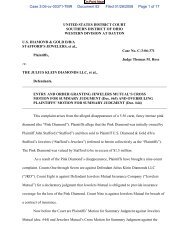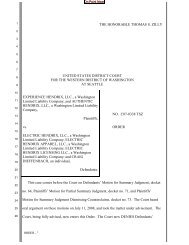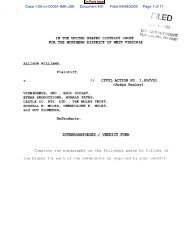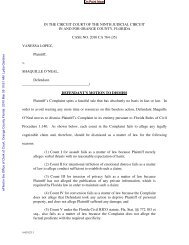GORDON KEENE VELLA. - On Point News
GORDON KEENE VELLA. - On Point News
GORDON KEENE VELLA. - On Point News
You also want an ePaper? Increase the reach of your titles
YUMPU automatically turns print PDFs into web optimized ePapers that Google loves.
accurately it is akin to a land war. (See generally Barden Decl. 12-20 and authorities cited<br />
therein.)<br />
However, rather than simply admit the controversial nature of his theory, Dr. Brown<br />
persists in misrepresenting surveys and studies as supporting a conclusion of general acceptance<br />
when they do no such thing.<br />
For instance, Dr. Brown cites certain surveys and testifies that a combined figure of 89%<br />
of respondent members of the relevant scientific community either consider dissociative amnesia<br />
valid or possibly valid. (Tr. at 46:14 – 47:4.) There are two major errors with Dr. Brown’s<br />
conclusion. First, the surveys to which Dr. Brown cites involved mostly practicing clinicians<br />
including psychiatrists, psychologists, social workers, counselors, and other types of therapists.<br />
However, practicing clinicians are not the “relevant scientific community” in this case. (Pope<br />
Decl. 36.) This is so because “such clinicians may or may not have sufficient training to be<br />
able to evaluate the merits of a theory such as ‘dissociative amnesia.’ Indeed, many types of<br />
practicing clinicians have had little formal scientific training, and very little ability to evaluate<br />
the methodology and conclusions of peer-reviewed scientific studies.” (Id.)<br />
Furthermore, even if clinicians are members of the relevant scientific community, Dr.<br />
Brown has misled this Court as to the meaning of these surveys. In particular, the inclusion of<br />
individuals responding “possibly valid” as being among those in general acceptance of the theory<br />
is without support. As Dr. Pope notes:<br />
The truth is that a response of “possibly valid” does not mean that a<br />
hypothesis is scientifically accepted. For example, many scientists would<br />
agree that there is “possibly” some form of life on Mars, at least on a<br />
bacterial level. A search for evidence of such life is currently underway.<br />
But the fact that many scientists think there is “possibly” life on Mars<br />
does not mean that it is generally accepted in the relevant scientific<br />
community that there is life on Mars.<br />
- 21 -
















